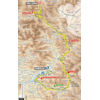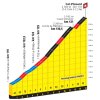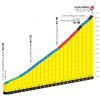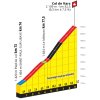Tour de France 2019 Route stage 18: Embrun - Valloire
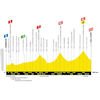
Slideshow 1/9
Thursday 25 July - The 18th stage of the Tour de France is the first race in the Alps. Following the start in Embrun the 208 kilometres route takes in the Col de Vars, Col d'Izoard and Col du Galibier before a flying descent into ski resort Valloire.
The race leaves from Embrun, in the 2013 Tour de France host to a climbing time trial that was won by Chris Froome. Four years later, in 2017, a stage set off in the Hautes-Alpes village and went to Salon-de-Provence, where Edvald Boasson Hagen brought the early break home.
A Boasson Hagen victory is highly unlikely this time, as the route traverses the Alps. Following intermediate climbs up the Col de Vars, Col d’Izoard and Col du Galibier the race ends with a descent to Valloire, which lies close to the summit of the Col du Télégraphe.
The Galibier is a grueling ascent of 23 kilometres. The first 14 kilometers are relatively easy. Actually this is the Col du Lautaret and gradients are hovering between 4 and 5%. The rest of the climb is 7 to 8% material with the last kilometre kicking up a little to 9%. Overall, the average gradient on the Galibier is 5.1%. After its crest – where the first three riders pocket time bonuses of 8, 5 and 2 seconds – the route continues with a 19 kilometres descent to the line in Valloire.
Valloire has rarely been included as an arrival. Obviously the village was a passage on numerous occasions on the way to the Galibier and in 2013 a stage left from Valloire to Ivrea. Attacker Beñat Intxausti took the win that day, outgunning Tanel Kangert and Przemyslav Niemiec in the sprint.
Time bonuses of 10, 6 and 4 seconds are awarded to the first three riders on the line. Plus, as mentioned, there are extra seconds available at the Galibier.
The is expected to finish around 17.15 local time.
Another interesting read: results/race report 18th stage 2019 Tour de France.
Tour de France 2019 stage 18: route, profiles, more
Click on the images to zoom
+ Click for more images (5)
Watch the highlights of recent races here:
Related articles The Route - Tour de France 2019 Riders - Tour de France 2019 Withdrawals - Tour de France 2019 Route and stages - Tour de France 2019 GC Favourites - Tour de France 2019 Visit the Tour de FranceMore articles Giro 2025 Route stage 3: Valona – Valona
Giro 2025 Favourites stage 3: Breakaway day
Giro 2025: Withdrawals
Giro 2025: Tarling bests Roglic by 1 second, Slovenian new leader
Giro 2025: The Route
Giro 2025: Riders
Giro 2025: GC Favourites
Giro 2025 Route stage 4: Alberobello – Lecce
Giro 2025 Favourites stage 4: For fast men #1
Giro 2025 Route stage 5: Ceglie Messapica - Matera
Giro 2025 Favourites stage 5: For fast men #2
Giro 2025 Route stage 6: Potenza - Naples
Giro 2025 Favourites stage 6: Hilly race with flat finale
Giro 2025 Route stage 7: Castel di Sangro - Tagliacozzo
Giro 2025 Favourites stage 7: First mountain top finish
Giro 2025 Route stage 8: Giulianova – Castelraimondo
Giro 2025 Favourites stage 8: Attackers in the Apennines
Giro 2025 Route stage 9: Gubbio - Siena
Giro 2025 Favourites stage 9: Strade Bianche alla Giro
Giro 2025 Favourites stage 10: For pure time trialists
Giro 2025 Route stage 11: Viareggio – Castelnovo ne’ Mont
Giro 2025 Favourites stage 11: Attackers in promising finale
Giro 2025 Route stage 10: Lucca – Pisa
Vuelta Femenina 2025 Route stage 6: Becerril de Campos - Baltanás
Cycling Calendar 2025
Tour de France 2025: The Route
Tour de France 2025 Route stage 1: Lille - Lille
Tour de France 2025 Route stage 2: Lauwin-Planque - Boulogne-sur-Mer
Tour de France 2025 Route stage 3: Valenciennes - Dunkirk

